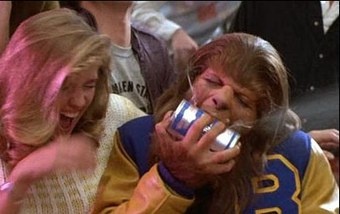License to Kill (1989) is an amazing movie in that it
exists. Timothy Dalton’s second and last turn as James Bond, the film opens
with the interruption of the wedding for Felix, Bond’s CIA buddy. The pair
arrive late to the wedding having captured – midair – a drug lord (Franz
Sanchez, played by Robert Davi) who, naturally, breaks out, tortures Felix with
a shark and kills his new bride just hours after the ceremony. This isn’t your father’s Bond. The usually calm 007 spends the movie vengefully tracking down
those responsible and, even with his license revoked, kills liberally
throughout.
License to Kill combines many of the best parts of James
Bond with the 1980s and does so much more successfully than the last two Roger
Moore films, Octopussy and A View to a Kill. Those fantastic Bond
motifs include: needlessly elaborate villainous plots (here: drug deals
involving televangelist Professor Joe Butcher), cheesy fake blood, sharks as
weapons, a villain named Killifer, a girl working for the villain whom Bond
turns, and an impossibly expansive, secret villain compound where Bond is
initially a guest but is soon placed into overly-complicated scenarios to
escape from (spoiler: he escapes).
The film is also darker than anything Sean Connery or Roger
Moore did, certainly influenced by other 80s action movies that trafficked in
moody, brooding heroes and cruel, maniacal antagonists. Bond even has a male
sidekick for once when one of Felix’s CIA buddies insists on helping him track
down the drug kingpin. Dalton uses fewer puns and one-liners than previous
Bonds, but really, was he going to say “He really put his best foot forward!”
after his friend loses a leg to a shark?
The performances are precisely what you’d expect from a Bond
movie. Dalton is confident in the role, even if he lacks some of the charm that
Connery originally brought to the character. Davi and Benicio Del Toro are
manic, deranged, and menacing as the drug lords, and the Bond girls, Pam
Bouvier and Lupe Lamora, make for strong, gun-toting female companions, even if
their characters are a little underdeveloped. (Shocking for a Bond movie, I
know.)
License to Kill is a fun movie, but by no means a great
movie. While it’s darker than all other Bond movies (before the Daniel Craig
trilogy, at least), the film lacks any real nuance and seems to relish finding
horrible, gruesome ways for people to die for no reason other than shock value.
The action scenes are crazy, of course, and there’s plenty of gunplay and
explosions to keep everyone happy. The plot, while more comprehensible than
some silly Bond plots before it, still relies on villains doing stupid things
and being unable to just shoot Bond in the head when given the chance. But if
you went to a Bond movie in 1989 expecting something else, you clearly hadn’t
seen the previous 15 movies.
For some reason, the film killed the Bond franchise for six
years and marked the end of Dalton’s brief, two-movie run as 007. Goofy and
over-the-top at times, License to Kill is still a good James Bond movie, and Dalton
made for a good, if unique, James Bond.
License to Kill: 4 of Patrick Swayze’s 6 abs
Extra abs
-
There are actually black people in this movie
who aren’t waiters or bellhops, another welcome departure from previous Bond
movies.
-
Bond does it all in this one: he flies, he
drives, he runs, he swims, he kills, he womanizes, and he wins.
-
Sanchez learns that one of his cronies has been
stealing from him. Instead of shooting him, he throws him in one of his ships
decompression chambers, turns up the pressure, then cuts the vent. The guy’s
head expands and explodes. Science!
-
There are a few good one-liners. Bond, after his
license is revoked and asked to turn in his pistol: “A farewell to arms, then.”
Even his jokes are based on melancholy, bleak 20th-century literature.
-
Other possible one-liners for Felix losing a leg:
o
“He always wanted to take a bite out of crime.”
o
“He was never afraid to go out on a limb.”
o
“Have any legs? Go fish.”
-
This was the last movie in which Desmond
Llewelyn played Q. I’m sure he’s building exploding watches for Jesus in Heaven
as we speak.





